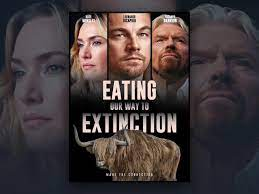Eating Our Way to Extinction is a documentary film, released in 2021, narrated by Kate Winslet, about the devastating impact of animal agriculture on the sustainability of the planet.
“Eating Our way to Extinction takes audiences on a cinematic journey around the world, from the depths of the Amazon rainforests to the Taiwanese Mountains, the Mongolian desert, the US Dust Bowl, the Norwegian Fjords and the Scottish coastlines, telling the story of our planet through shocking testimonials, poignant accounts from indigenous people most affected by our ever-changing planet, globally renowned figures and leading scientists” [1]
The documentary contains contributions from scientists in the field such as Joseph Poore [2a],[2b] who was referenced in the recent IPCC climate report and been quoted several times on this blog.
A number of issues are covered …
- The impact on indigenous populations of deforestation due to livestock farming, including destruction of villages and pollution of water sources
- Green House Gas emissions (GHG) from livestock farming contributing to global warming
- Extensive ocean dead zones caused by fertiliser and effluent run off. Here in the UK, ‘Free Range’ chicken farms are killing the River Wye [3]
- Switching from meat to fish is not a solution : “Our taste for fish is literally draining our oceans of life”
The Great Pacific Garbage Patch is 90% discarded fishing gear. - The subsidies that sustain the meat industry: in the US last year the meat and dairy industry received $38 billion in subsidies compared with $20 million for fruit and vegetables
- In a world of increasing drought, one third of fresh water in the world is used for animal agriculture. “Water alone dictates that we must change our diet”
- The risk of human pandemics exacerbated by the meat industry (think swine flu which has already killed up to 500,000 people [4], ebola, Mers, bird flu, measles which evolved form a cattle virus)
- The spread of antibiotic resistance because of its use in the livestock industry
- The grisly tasks that many butchers have to undertake while preparing their meat for sale
- There was good news: humans can thrive on a plant-based diet in all stages of their lives. The numbers of people on plant-based diets is growing, and food outlets and shops are supplying an increasing range of plant-based productsBut the documentary provides a stark picture of what is already beginning to occur and where this could go. A sustainable planet cannot exist alongside meat and dairy diets.
Aircraft Green House Gases
Clearly there are other areas which need to be addressed.
Sir Richard Branson was one of the executive producers of the film so it is interesting to see what the film had to say about flying.
The first thing to note is that a contributor was allowed to dismiss tackling aircraft GHG emissions with the comment, “we’re always going to use those things”. It is unlikely that such a comment would have been allowed to stand without the approval of the executive directors.
If we took the same view about other causes of global warming then nothing would be done!
Flying accounts for around 2.5% of global CO₂ emissions, but 3.5% when we take non-CO₂ impacts on the climate into account [5]. So it has a smaller impact than food production, but is not insignificant. There is a worldwide pattern of a small group taking a large proportion of flights, while many people do not fly at all [6].
The fact is that flying as a source of GHG must also be cut back to meet environmental targets.
It should not be done by using ‘Sustainable Aviation Fuel’ produced from animal fat waste [7]. This high-carbon resource should not be available in the first place. The market for SAF would have the bizarre effect of providing an economic incentive for livestock farming which this film has just condemned.
Neither should it be done by using plant-based biofuels which take away land available for food production and wildlife, raise food prices in the process, and burn carbon instead of storing it. In short, unsustainable and unjust.
This means that currently the only option is to rapidly and significantly reduce flying, particularly by frequent flyers, while accepting it is reasonable for some flying to occur.
But the force of arguments in this documentary must not be discounted simply because a major shareholder in an airline company was involved in its production.
This was a well produced film, packed with information – well worth watching
References
[1] https://eating2extinction.com
[2a] Poore & Nemecek (2018) Reducing food’s environmental impacts through producers and consumers
http://science.sciencemag.org/cgi/content/full/360/6392/987
[2b] https://josephpoore.com
[3] https://www.theguardian.com/environment/2021/jul/14/livestreamed-documentary-rivercide-to-unmask-uks-water-polluters
[4] https://en.wikipedia.org/wiki/2009_swine_flu_pandemic
[5] https://ourworldindata.org/co2-emissions-from-aviation
[6] https://www.theguardian.com/world/2021/mar/31/elite-minority-frequent-flyers-aviation-climate-damage-flights-environmental
[7] https://www.neste.com/en-us/products-and-innovation/sustainable-aviation/questions-and-answers-about-saf
